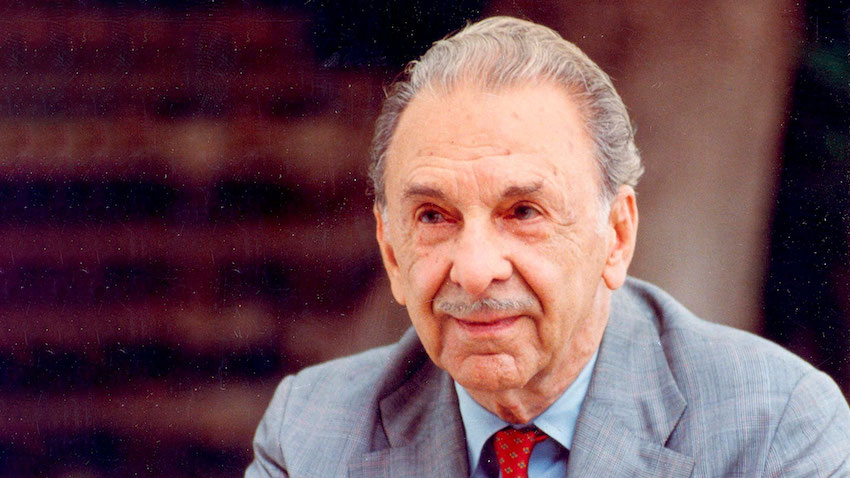JRD TATA – THE POWER OF A VISIONARY

Jehangir Ratanji Dadabhoy Tata, famously known as JRD Tata, was born on 29th July 1904 to a Parsi family in France. His father Ratanji Dadabhoy Tata was the first cousin of Jamshetji Tata, who was one of India’s greatest pioneers. His mother, Suzanne Sooni Briere, was a French and JRD Tata spent much of his childhood in France.
JRD Tata’s father moved to India from France when he joined the Tata company. However, his mother died at the young age of 43 while she was still living in France. JRD Tata received a wide perspective on life during his education in London, Japan, France and India. After completing his higher education, in 1929, JRD Tata renounced his French citizenship and decided to become an Indian citizen.
In 1925 he joined Tata Sons as an unpaid apprentice and in 1938, just at the young age of 34 years, JRD Tata became the Chairman of Tata Sons, thus becoming the head of the largest industrial group in India. The Tata Group of Companies under the leadership of JRD Tata went on to become India’s most loved company. It spread its wings in the sectors of steel, engineering, hospitality, power and chemicals.
JRD Tata used to tour a lot and on one of his tours, he was inspired by the aviation pioneer Louis Bleroid, his father’s friend. Louis also became the first man to fly across the English Channel. JRD Tata was the first person to obtain a flying license issued in India in 1929. India’s first commercial airline was founded by JRD Tata in 1932. He named it Tata Airlines. In 1946, it became Air India and India’s National Airline. JRD Tata flew the first commercial mail flight to Juhu. This was the time when the country was struggling to establish a good railway system. In the history of Indian Aviation, the first flight took off from Drigh in Karachi to Madras with JRD controlling the flight at the helm. In 1948, Air India International started operations.
In 1953, there was a lot of debate and discussion between the Government of India and JRD Tata with regards to the nationalisation of the airline. JRD Tata was not in favour of the nationalisation of the airline, however, the Government of Jawaharlal Nehru went ahead with their plan, and 1953, Tata Airlines was nationalised. JRD Tata was appointed as the chairman of Air India in 1953 by the Government of India. He was also appointed as a director on the board of Indian Airlines. He held this position for a remarkable 25 years with not even a single opposition. He was bestowed with the title ‘Honorary Air Commodore of India’ for his unbelievable extraordinary achievements in aviation. The then Prime Minister, Indira Gandhi wrote to JRD Tata saying – “we are proud of you and of the airline. No one can take satisfaction from you. No one can step to you in respect.”
What made JRD Tata different from probably any other great businessman and industrialist was the high ethical standards that he set for himself and for others. He was known for rejecting bribes from very famous and influential personalities. He was also famous for never bribing anybody even under extreme pressure. He was one of those rare great personalities who was not moved by the prevailing black-market system in India.
The assets of the Tata Group grew from US$100 million to over US$5 billion under his chairmanship. When he took over as the Chairman of Tata sons in 1938, the Tata Group comprised 14 enterprises and by the time he left in 1988, the Tata Group was a conglomerate of 95 enterprises (either started by Tata Group or joint-ventures with significant holding).
From its inception in 1932, JRD Tata was the trustee of the Sir Dorabji Tata Trust. The Trust greatly benefited under his leadership. It played a major role in the contribution of some of the greatest institutes and hospitals. He founded the Tata Institute of Social Sciences, TISS, in 1936. It was a beacon of light for rural India as it monitored the competence of rural development in the field of science. In 1941, the Trust developed The Tata Memorial Center for Cancer, research and treatment, Asia’s first cancer centre in Bombay. In 1945, JRD Tata founded the Tata Institute of Fundamental Research (TIFR). He also established the National Center for Performing Arts. JRD Tata was also the founding member of The National Council of Applied Economic Research in New Delhi, India’s first independent economic policy institute.
In 1945, JRD Tata went on to establish the iconic Tata Motor’s first automobile factory in India. The company has touched the lives of millions by making transportation easier and comfortable with the manufacture of trucks, utility vehicles, defence vehicles and passenger cars. In 1968, JRD Tata founded a Tata computer centre and named it TCS (Tata Consultancy Service), which today is one of the largest and most reputed Indian MNC in the IT world. In 1987, JRD Tata founded Titan Industries, which today is one of India’s largest consumer products companies.
JRD Tata had an extraordinary sense of anticipation, almost to the level of perfection. Seeing the advent of the refugees during the time, he recommended that the government create funds which can be used to provide sanitation facilities, like the construction of washrooms and other essentials. Though the Government did not participate wholeheartedly, his recommendations would later be accepted completely by the later government bodies of India in the form of Prime Minister’s Relief Fund which is now used for areas suffering from natural calamities.
JRD Tata was not hesitant to call a spade a spade. In one of his interviews, he mentioned that when he was a young man, he was a very angry young man because India was under a foreign rule. People were oppressed. He continued to say that now he was a very angry old man because of all the opportunities that have been missed. He was also extremely upset when the then government did not pay heed to his advice on controlling the population growth. JRD Tata had warned several times that families needed to become aware of that. However, his ideas were dismissed by the Government on the premise that the population was going to be the country’s biggest strength. In due course of time, India paid the terrible price for not listening to a visionary.
JRD Tata was a leader beyond books and description. He loved his employees and cared for them. His concern was the employee is considered legendary even by today’s standards. His thoughtfulness brought about several changes in the policies and practices of the Tata Group companies to suit the needs and benefit the workers. He was a pioneer in starting programs which would bring employees closer to management. He firmly advocated the employee welfare schemes like an eight-hour rule, creating provident funds, providing medical insurance, and an accident compensation scheme. In years to follow, the Indian Government adopted many of these initiatives and practices of the Tata Group and made them mandatory statutory requirements in India.
In 1979, Tata Steels came up with a new practice which made them India’s most beloved company. Under the leadership of JRD Tata, the new practice stated a worker will be deemed to be ‘at work’ from the time the worker leaves home till the time the worker reaches home from work. The company thus became financially liable to the worker and the worker’s family in the event of any mishap or accident. This kind of employee-centric practice was never heard of during that time.
In one of his interviews when asked why he chose Ratan Tata to be his successor, JRD in what could be considered an angelic humility said that Ratan Tata was a young man with a young mind. He went on to say that Ratan Tata proposed to make use of Tata Industries to sponsor new industries, as he felt that it was a good instrument and would bear Tata’s a good name. JRD Tata told him “yes, you go ahead and be the chairman of it.”
In the words of Khorshed A Divecha, The Asst. Director of NCPA, when speaking about JRD Tata – ‘He has touched the power but he is untouched by it and that is his humility’.
JRD Tata passed away in Geneva, Switzerland, in 1993 at the age of 89 years. It is said that a few days before his passing he had said “Comme c’est doux de mourir” (“How gentle it is to die”). Upon his death, the Indian Parliament was adjourned in his memory – an honour not usually given to persons who are not members of parliament. He was buried at the Père Lachaise Cemetery in Paris.
During his lifetime, JRD Tata was the recipient of a number of awards and honours.
- In 1948, the Indian Air Force, conferred upon him the honorary rank of Group Captain. In 1966,he was promoted to the Air Commodore rank (equivalent to the Brigadier rank in army). He was further promoted to the Air Vice Marshal rank in 1974.
- In 1955, he was awarded Padma Vibhushan by the President of India.
- He was the recipient of Tony Jannus Award in 1979
- In 1985, he received the Gold Air Medal of the Federation Aeronautique International
- He was also the recipient of the Edward Warner Award of the International Civil Aviation Organisation, Canada in 1986
- He was conferred the French Legion of Honor in 1983.
- Due to his selfless humanitarian endeavours, exceptional love for the countrymen, his exemplary visionary style, JRD Tata was awarded the highest Indian civilian award, the Bharat Ratna in 1992.
- The Government of Maharashtra named its first double-decker bridge the Bharatratna JRD Tata Overbridge at Nasik Phata
K.R Narayan; Former President of India considers him ‘Father of Industrial Revolution conceptually as well as practically.’
“I was lucky to have him there. He was my greatest mentor… He was like a father and a brother to me — and not enough has been said about that” Ratan Tata on JRD Tata.
In an Outlook magazine poll in 2012, conducted in conjunction with CNN-IBN and History 18 channels with BBC, JRD Tata was ranked the 6th Greatest Indian.
Credits and suggested further reading:
https://en.wikipedia.org/wiki/J._R._D._Tata

